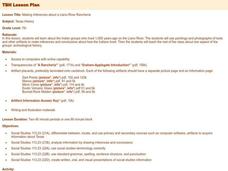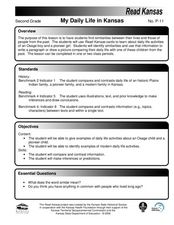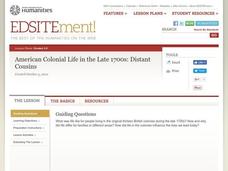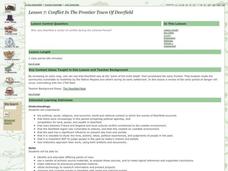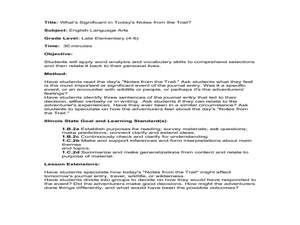Reed Novel Studies
The Witches: Novel Study
Are witches like lions in sheep clothing? A boy and his grandmother in The Witches thinks so. They have even discovered the secret to recognizing these evil beings that disguise themselves as sweet ladies. Scholars use the resource to...
National Endowment for the Humanities
Walt Whitman to Langston Hughes: Poems for a Democracy
Explore the idea of democratic poetry. Upper graders read Walt Whitman, examining daguerreotypes, and compare Whitman to Langston Hughes. They describe aspects of Whitman's I Hear America Singing to Langston Hughes' Let America Be...
Reed Novel Studies
Freak The Mighty: Novel Study
They say when you are told something enough times, you eventually begin to believe it's true. Sadly, Max in Freak The Mighty believed he was stupid and dumb, so he learned to be alone. That changed when he met another outcast, Freak....
Reed Novel Studies
Stone Fox: Novel Study
Wyoming has the lowest population of all 50 states. Using the novel study for Stone Fox by John Reynolds Gardiner, pupils create brochures to attract visitors to the state, which is the setting for the novel. Additionally, they answer...
Reed Novel Studies
Sounder: Novel Study
Only one character receives a name in William H. Armstrong's novel, Sounder—the dog! With the novel study, scholars explore the author's purpose in the unusual decision. They also write similes, answer comprehension and analysis...
Reed Novel Studies
What Katy Did: Novel Study
What doesn't break you
makes you stronger. Katy, in What Katy Did, learns this lesson the
hard way. After a terrible accident and a long recovery, Katy becomes what she always wanted to be—good and kind. Scholars learn
about Katy's...
Balanced Assessment
Movie Survey
Movie preferences will get your classes talking! Individuals read a pie graph and construct a bar graph using the same information. They then answer questions specific to the data and sample size.
EngageNY
Contrasting Two Settings (Chapter 6: "Lost Melones/Cantalouples")
Continue working through Esperanza Rising, by Pam Munoz Ryan, by looking into language choices and discussing text-dependent questions. Pupils converse in small groups and as a class about plot, setting, and figurative language. Using...
Science 4 Inquiry
The Ups and Downs of Populations
Life has its ups and downs ... especially if you're an animal! Biology scholars engage in a population study through an inquiry-based activity. Pupils work together to explore the factors that affect deer populations, then examine the...
Curated OER
Making Inferences about a Llano River Rancheria
Seventh graders study the Indian groups who lived 1,000 years ago on the Llano River. They use paintings and photographs of tools and other artifacts to make inferences and conclusions about how the Indians lived.
Curated OER
My Daily Life in Kansas
Second graders use 'Read Kansas' cards to learn about the daily life activities of an Osage boy and a pioneer girl. In this similarities and differences lesson, 2nd graders write a paragraph and draw a picture comparing...
Curated OER
Wilson Stands Alone in His Plan for World Peace
Students study the Fourteen Points. They examine motives behind Wilson's Fourteen Points and why most of them were rejected by France. They answers questions concerning primary resources (casualty list and before and after...
Curated OER
American Colonial Life in the Late 1700s: Distant Cousins
Students explore daily life and its influences in the late 1700s for two families in different colonies- Delaware and Massachusetts by becoming historical detectives. After gathering information from artifacts to make inferences about...
Pennsylvania Department of Education
Comparing Key Ideas and Details in Fiction and Nonfiction
Students recognize the differences between fiction and nonfiction texts. In this genre study instructional activity, students discuss what nonfiction means and write the definition. Students listen to a read aloud and vote whether the...
Curated OER
Seeing Art in Historical Context: An Activity to Promote Visual Literacy
Young scholars consider works of art in their historical context. In this art in historical context lesson, students are encouraged to think about and record their prior knowledge of the historical period and to make inferences about the...
Curated OER
Reading Comprehension: Jamaica Louise James
In this reading comprehension worksheet, students cut out 5 bookmarks. Each bookmark focuses on a story element in the book Jamaica Louise James by Amy Hest. Students answer the questions on the bookmarks. Included are: making...
Curated OER
Lead Critical Reading
Students read opposing views on the lead contamination issue, identify the facts and opinions in each article, and infer the opinion of the author. They create an essay expressing their opinion on the issue complete with citations.
Curated OER
Transcendentalism and Epiphany in Ray Bradbury's Dandelion Wine
Twelfth graders examine the characteristics of transcendentalism. In this transcendentalism lesson, 12th graders determine what this type of writing entails before reading a passage from, Ray Bradbury's, Dandelion Wine. They cite three...
Curated OER
Child Labor in the Carolinas
Fifth graders explore child labor and how children were exploited and used in the work place. In this Industrial Revolution lesson, 5th graders research child labor by reading, looking at photographs and drawing conclusions...
Curated OER
Conflict in the Frontier town of Deerfield
Students use primary sources to investigate, explore and represent varying perspectives on the 1704 Deerfield Raid. They consider the reasons Deerfield was at the center of English, French and Native American conflicts in the early 18th...
Curated OER
What's Significant in Today's Notes from the Trail?
For this lesson, you will need access to "Notes from the Trail." Your learners will read the day's text, and identify the most important or significant event in the journal entry. Not many prompting questions are provided, and some of...
Curated OER
Inference Activity
In this inference learning exercise, learners look at pictures and read sentences, writing yes or no on a line to indicate whether the statement "sounds right."
Curated OER
Traveling With Limited Funds; A Tree Grows in Brooklyn
Students participate in a pre-reading activity which helps them see what it would be like to live in poverty. In this reading comprehension lesson, students make a list of items they take on a trip considering they have very limited...
Curated OER
“THE LORAX” by Dr. Seuss
Few children's books convey the message of conservation as well as Dr. Seuss' The Lorax. Read the story aloud, emphasizing the interconnectedness of plants and animals in an ecosystem and discussing different ways people can help...







